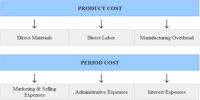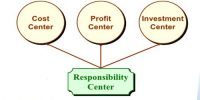Opportunity cost: Opportunity cost is an economics term that refers to the value of what you have to give up in order for choosing something else. It refers to the value forgone in order to make one particular investment instead of another. Another consideration in a make or buy decisions is whether the firm has alternative uses for its facilities if it should decide to buy the product from an outside supplier. If it can use the facilities to earn additional revenue, it may be better to buy on the outside rather than a loss this revenue, loss revenue represents an opportunity cost, that is, the segment margin foregone when one alternative is chosen over another. It represents the benefits an individual, investor or business misses out on when choosing one alternative over another. This cost does not a cash outlay. Rather it represents the loss of segment margin that would have been received had the occur alternatively been chosen.
For example, in the make or buy situation discussed above, assume that Balson manufacturing company has an alternative use for the facilities that it now uses to make the part. If it buys the part on the outside, it can use its facilities to manufacture another product that will provide a segment margin of $25,000. If it continues to make the part, it wills loss the opportunity to earn this additional segment margin. The segment margin of $25,000 represents an opportunity cost. Balson must consider this cost its make or buy analysis.
















